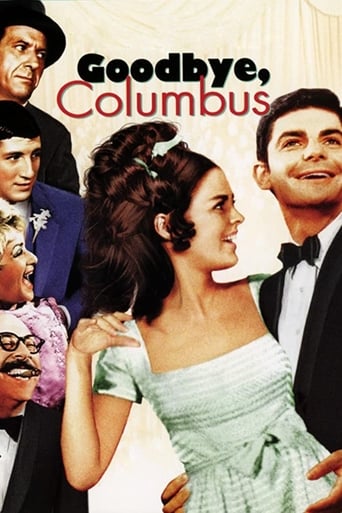summer1111dg
This was the introduction of Ali MacGraw to movie audiences. I can't think of anyone who could have played Brenda Patimkin more believably. She is perfectly cast, as the spoiled, self-involved, smart, gorgeous princess daughter of a wealthy Jewish family. No one plays spoiled, bright and beautiful better than Ali MacGraw.I also love Richard Benjamin as her unmotivated, anything but ambitious suitor, Neil Klugman. He is the antithesis of everything Brenda and her family epitomize. The dichotomy is that while he espouses supposed disdain for all they represent -- he is more than willing to be seduced.There is a classic scene where Neil is stuffing his pockets full of grapes and is caught by the younger sister. He tries to hide the fact that his pockets are gorged with luscious fruit. But she calls him out on what he is doing.The romance is a departure for Brenda. Neil, though Jewish, is a forbidden fruit of sorts. He is not ambitious or destined to be successful husband material. Therefore he is a completely inappropriate choice of suitor for Brenda. This of course makes him all the more attractive -- at least temporarily for Brenda who is rebelling against her mother.
Noir-It-All
I remember enjoying this film in the theater. I saw some similarities between my life and that of the Potamkins, if not their religion, the suburban household complete with a father from the city. College-bound, I looked to Ali McGraw as a role model. She always conveyed the image of the east coast college girl portrayed in Seventeen magazine, Glamour and Mademoiselle, wearing the clothes shown in these magazines. I was also struck by Jack Klugman's performance as the provider operating a plumbing supply business in the Bronx. Like Jack Klugman, my Dad grew up in South Philadelphia. My uncle stayed there, commuting to a lumberyard in North Philly. Jack Klugman should have been nominated for and won an Oscar just for that scene with Neil in his office, leaving an impression on me long after leaving the theater. Neil himself? I worked in a library, too, and really liked it! Finally, the romance. I dated a Jewish guy from Northeast Philly. Whenever his parents came home from a wedding, they compared the reception to the one in this film.
thebaldguy
At the dinner table Harriet, Ron's fiancé, is supposed to call at 5 o'clock and Julie, his little sister, is confused and says that it already was 5 o'clock. She is then told that it is 5 o'clock in Columbus and asks if you could travel back and forth and never grow old. Brenda supports this sarcastically, "Oh that's right sweetie" and is than castigated by her mother for giving the younger sibling misinformation. I am assuming that they mean Columbus,Ohio, the location of Ohio State, Ron's school, but this makes no sense since Columbus, Ohio is in the same EST time zone as Purchase, New York where the action is taking place. This appeared to be a goof, but I was at a loss to explain it until I reread the original Philip Roth Novella, which placed Harriet in Milwaukee and in the Central Time Zone. The screenwriter put her in Columbus for some reason, but neglected to realize that Columbus is in the Eastern Time Zone and that this great dialog would have this inaccuracy.
Keith Orr
One of the simple pleasures of viewing Woody Allen's films is you don't have to be kosher necessarily to relate to Allen's stock character of the down-trodden goy fraught with a plethora of neurosis-everything from sexual dysfunction to the nagging doubt predicated by existential angst over our natural inclination towards God and the infinite. What cheap shots Allen did throw at religion were strictly for laughs both as parody and commentary. In other words, Catholicism and Judaism suffered slings and arrows in the same measure. At the time ofthe film's release, "Goodbye, Columbus" was criticized for being "too jewish". It's simple tale of nice jewish boy meets spoiled jewish princess meets crass wealthy jewish family (who somehow along the way forgot their humblebeginnings) is met with tribulation and turmoil mostly from shrewish jewishmother inevitably leading to a parting of the ways for nice jewish boy arrived during a period in Hollywood when the youth of America were being heard atpeace marches, flag burnings, love-ins, gay and feminist movements, sexualliberation and draft dodging. From 1967-72, audiences were being treated tofilms of relevant social commentary beginning with "The Graduate" and justabout ending with the release of "Harold and Maude". It's all good as it was all about consciousness-raising. Among them, "Goodbye, Columbus" is a bit of apeon but a film that still remains a stinging comment on class-consciousAmerica in it's whole up-the-rich-screw-the-poor-warts-and-all approach tostory telling. Richard Benjamin is fine as Neil, a man smitten by Ali McGraw (her debut) as Brenda but taken aback by her family and her unremittingdependence on them. The final scene involving Brenda's willingness to commit an unconscionable act of sex sans condom and it's consequences promptingNeil's apathy to face the world wiser but at least no worse for the wear remind us of just how emotionally disconnected most Americans were in the latesixties. We were battered and bruised having come through an unpopular war .Add to that the violent demonstrations we were witnessing at home leaving anation numb if not weary. Perhaps the most evocative scene which says themost about our culture is the wedding reception for Brenda's lunkhead brother in which friends and relatives descend upon the banquet table like a plague of locusts devouring everything in sight. It sets just the right tone for the film: 'I'm so hungry, I'd eat my own kind. And only then with certain reservation.'




